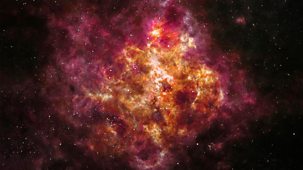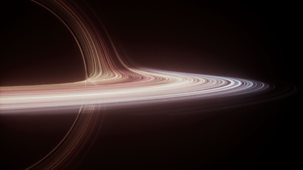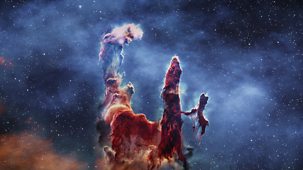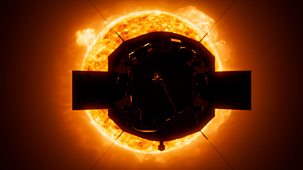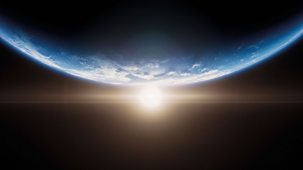
Series 1: 2. Alien Worlds: The Search for Second Earth
Humans have long gazed up at the night sky, wondering whether other lifeforms and intelligences could be thriving on worlds far beyond our own.\n\nAnswering that question seemed fated to remain pure speculation. But over the last few decades, ultra-sensitive telescopes and dogged detective work have transformed alien planet-hunting from science fiction into hard fact. Gone are the days of speculation; the hunt for extraterrestrials has become a matter of serious scientific inquiry. \n\nAs the hunt for alien worlds began, we expected to find worlds similar to the planets in our own solar system, but we instead discovered a riot of exotic worlds. Vivid animation based on data from the most successful planet hunter of them all, the Kepler space telescope, brings these worlds into view: puffy planets with the density of polystyrene, unstable worlds orbiting two suns and 1,000-degree, broiling gas giants with skies whipped into titanic winds.\n\nBut perhaps the most startling discovery was the number of worlds that may be contenders for a second Earth. Our latest survey of the galaxy estimates that there are billions of rocky planets at the right distance from their sun to have that ingredient so crucial for life as we know it, liquid water. Amongst them, we witness the most tantalizing discovery of all: a so-called ‘super-Earth’, situated in the Goldilocks zone - the area just the right distance from a sun to potentially support life - and with the faint signal of water in its atmosphere.\n\nWith over 2,800 exoplanets confirmed by Kepler and discoveries still rolling in, Brian lays out his own answer to the age-old question with thrilling new science: are we alone?
Source: BBC 2
Most recent episodes of Universe
Universe
Series 1: 5. The Big Bang: Before The Dawn
Professor Brian Cox asks the ultimate question: how did the universe come to be? It is daunting in its scale. We live on one planet of eight that orbit just one of the 400 billi ...
11-10-2023
BBC 2
Universe
Series 1: 4. Black Holes: Heart Of Darkness
Professor Brian Cox continues his epic exploration of the universe with a journey into darkness. The centre of our galaxy is home to an invisible monster of unimaginable power & ...
04-10-2023
BBC 2
Universe
Series 1: 3. The Milky Way: Island Of Light
Professor Brian Cox continues his epic exploration of the cosmos by looking at the faint band of light that sweeps across the night sky - our own galaxy, the Milky Way. The Sun ...
27-09-2023
BBC 2
Universe
Series 1: 2. Alien Worlds: The Search For Second Earth
Humans have long gazed up at the night sky, wondering whether other lifeforms and intelligences could be thriving on worlds far beyond our own.\n\nAnswering that question seemed ...
20-09-2023
BBC 2
Universe
Series 1: 1. The Sun: God Star
Professor Brian Cox begins his epic exploration of the cosmos with a hymn to the great luminous bodies that bring light and warmth to the universe: the stars.\n\nIt is estimated ...
13-09-2023
BBC 2
Most popular episodes of Universe
Universe
Series 1: 5. The Big Bang: Before The Dawn
Professor Brian Cox asks the ultimate question: how did the universe come to be? It is daunting in its scale. We live on one planet of eight that orbit just one of the 400 billi ...
11-10-2023
BBC 2
Universe
Series 1: 1. The Sun: God Star
Professor Brian Cox begins his epic exploration of the cosmos with a hymn to the great luminous bodies that bring light and warmth to the universe: the stars.\n\nIt is estimated ...
13-09-2023
BBC 2
Universe
Series 1: 3. The Milky Way: Island Of Light
Professor Brian Cox continues his epic exploration of the cosmos by looking at the faint band of light that sweeps across the night sky - our own galaxy, the Milky Way. The Sun ...
27-09-2023
BBC 2
Universe
Series 1: 2. Alien Worlds: The Search For Second Earth
Humans have long gazed up at the night sky, wondering whether other lifeforms and intelligences could be thriving on worlds far beyond our own.\n\nAnswering that question seemed ...
20-09-2023
BBC 2
Universe
Series 1: 4. Black Holes: Heart Of Darkness
Professor Brian Cox continues his epic exploration of the universe with a journey into darkness. The centre of our galaxy is home to an invisible monster of unimaginable power & ...
04-10-2023
BBC 2


